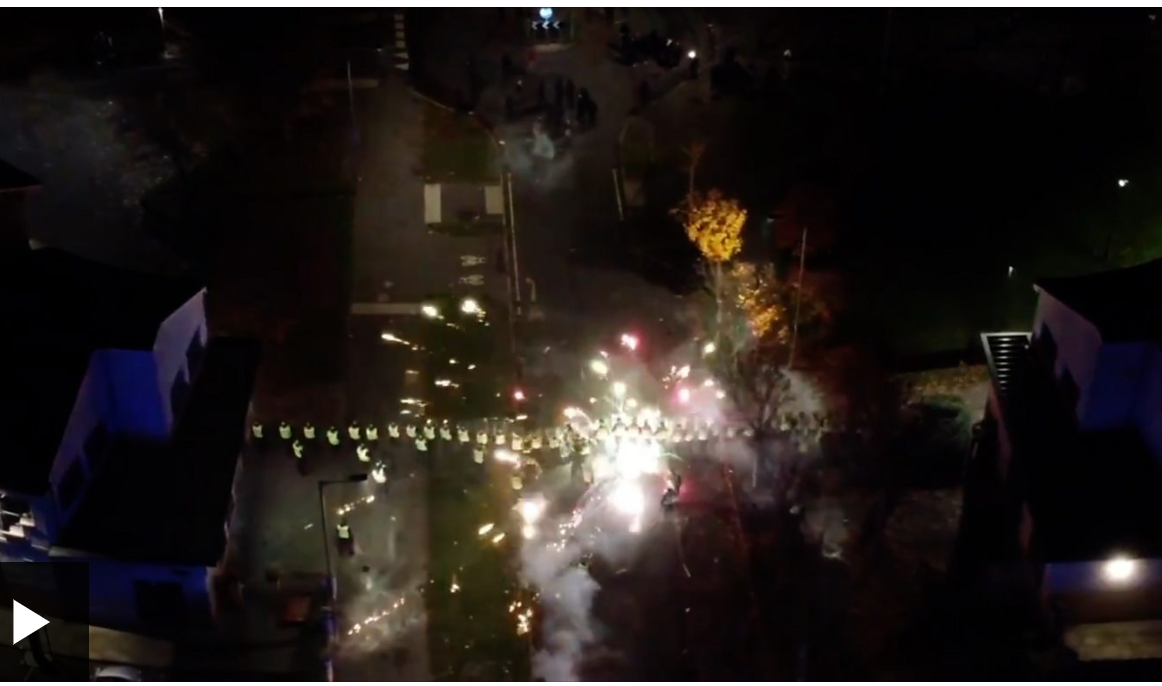Police assert that violence during Bonfire Night in Niddrie and Glasgow was premeditated and orchestrated

What the police called planned conflicts on Bonfire Night in Scotland resulted in the injuries of eight police officers.
The worst disturbance occurred in Edinburgh's Niddrie neighborhood when fifty young people threw petrol bombs and pyrotechnics at riot police.
Police Scotland reported that "unprecedented levels of violence" resulted in eight officers receiving minor injuries.
Cammy Day, the head of Edinburgh City Council, has advocated for a prohibition on the public sale of pyrotechnics.
Additionally, First Minister Humza Yousaf reported that in certain areas of Scotland, especially in Niddrie, there had been "disgraceful scenes of fireworks misuse".
Police Scotland respond live to violence on Bonfire Night
Is it possible to stop violence during fireworks season?
Fourteen accused of inciting unrest on bonfire night
He said, "Those responsible should feel the full force of the law," on the social media platform X, formerly known as Twitter.
At approximately 16:40 on Sunday, there were reports of antisocial usage of pyrotechnics, therefore police were sent to the Hay Avenue area of Niddrie.
Social media posts featured pictures of onlookers taking in the mayhem. In the videos, teenagers were gathered on a green, and officers were being attacked with explosives. A few are spotted recording the action.
Before police came, some fifty young people, along with a bigger group of adults and youths, were in charge of aiming fireworks toward buildings and cars, according to the police.
Monday morning, there was a cleanup effort in Niddrie.
In other occurrences, two police cars in Dundee's Beauly Square neighborhood sustained damage from brick strikes.
Officers in Glasgow were called to the Quarrywood Avenue neighborhood of Barmulloch after a report of two groups of young people fighting and hurling pyrotechnics at each other.
Eight police officers were hurt in total in Glasgow and Edinburgh.
An "unacceptable and frankly disgusting level of disorder that left communities alarmed and police officers injured" was the result of a small number of people, according to Assistant Chief Constable Tim Mairs, who oversees the Operation Moonbeam fireworks policing program.
In an interview with the BBC's Good Morning Scotland, he stated: "It is certain that adults were involved in planning that behavior and providing those youths with weapons.
"I wish to be precise. This was not a youth antisocial behavior incident that happened on its own.
"This was a concerted effort to attack police and emergency workers - and actually to attack the community of Niddrie - orchestrated by adults."
According to ACC Mairs, the police had taken "hours and hours of footage" as evidence and had only made one arrest at the site.
He praised his police for responding "professionally, with discipline and courage" in the face of "horrific conditions".
A police and youth standoff in Niddrie was captured on camera.
During the course of eight hours on Bonfire Night, the Scottish Fire and Rescue Service reported that nine attacks occurred against its staff, subjecting them to bricks and fireworks.
The locations of the attacks were Blackburn in West Lothian, Blantyre in South Lanarkshire, Dundee, Edinburgh, and Glasgow.
There were no firefighter injuries. After a brick broke through the windscreen of a fire appliance located in West Lothian, it was necessary to take it out of service.
Sunday's events came after two earlier weekend attacks in Troon and Glasgow, and four attacks on crews in Ayrshire and Edinburgh in the week before Bonfire Night.
The combined total of 15 attacks in the past week have been deemed "completely unacceptable" by Assistant Chief Officer Andy Watt.
"Our employees should be able to perform their duties without facing harassment," he declared. The fact that some have attempted to harm firefighters and cause damage to our appliances is disheartening.
"This type of behaviour not only prevents our crews from bringing any emergency to a safe and swift conclusion, but it can impact on our emergency service colleagues - including the police - when they are supporting us on scene to ensure the safety of our personnel."
Ban on fireworks
Cammy Day, the leader of the City of Edinburgh Council, called the attacks "unprecedented... disgusting and appalling."
"The behaviour of a small group of people who have attacked police officers during the line of duty, disrupted a whole community and lead to us having to close down a part of the east of the city last night," added the officer.
"In my lifetime I have never seen this to this extent, so we have called for an urgent debrief early this week to look at what happened, how that plan was executed and how we plan ahead for the future," he said.
Mr. Day endorsed a ban on the sale of fireworks to the general public and stated that the council would now attempt to enact powers to avoid a recurrence of the events on Sunday.
"I absolutely respect this; it seems unfair to punish us all for that, including myself, my entire family, and everyone else," he uttered.
However, I believe that there is enough risk to people—especially first responders—that the sale of fireworks in public should be reevaluated.
"Because if we don't do something that's quite drastic I would hate to think what happens the next time."